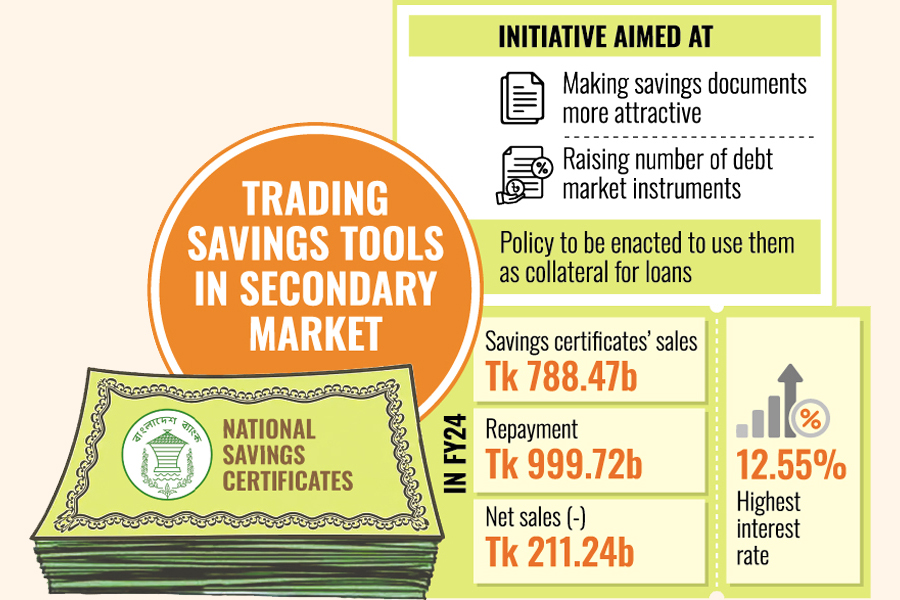
Published :
Updated :

The government wants to make national savings instruments tradable to make them more attractive to people and enhance the number of instruments on the debt market, officials have said.
Presently, savings instruments are not tradable in any way and cannot be used as collateral for taking loans like fixed deposit receipts (FDRs). The investment in savings instruments remains stuck only with the government.
The Finance Division made the decision last week at a meeting, with Finance Secretary Dr Md Khairuzzaman Mozumder in the chair. The meeting also discussed the bond market development and asset securitisation procedure.
Asset securitisation is a process where illiquid assets, like mortgages or credit card debts, are bundled and transformed into securities, which are then sold to investors. This allows the original holders of the assets to free up capital and potentially access new funding opportunities.
Sources said the meeting discussed that an investor can take loans from banks by keeping FDRs as mortgages. Due to this provision, one can use his/her deposit as collateral when he/she is in need of money.
However, national savings instruments have no mortgage value and can not be used as collateral to take loans.
The meeting discussed that a policy will be enacted to use savings instruments as collateral to borrow money.
Moreover, the meeting also discussed the required process to trade savings instruments in the secondary market on the bourses.
A senior Finance Division official told The Financial Express they had discussed the issue and will "work actively" to make savings instruments tradable keeping in mind its importance.
According to officials, there are only a few tradable instruments in the debt market - the government's treasury bills and bonds. Even corporate debentures are not being traded in the debt market.
Presently, there are four types of savings instruments managed by the Department of National Savings - five-year Bangladesh sanchayapatra, three-monthly profit bearing sanchayapatra, poribar sanchayapatra (family savings certificate), and pensioner sanchayapatra.
Besides, there are four kinds of bonds, also run by the Department of National Savings - Bangladesh Prize Bond, Wage Earner Development Bond, US Dollar Premium Bond, and US Dollar Investment Bond.
In FY24, savings certificates amounting to Tk 788.47 billion were sold, while the repayment was Tk 999.72 billion. Thus, net sales fell by Tk 211.24 billion.
The outstanding amount of savings certificates at the end of the fiscal year was Tk 3.39 trillion. The highest rate of interest of savings certificates is now 12.40 per cent.
Dr Zahid Hussain, a former lead economist in the World Bank's Dhaka office, finds the lack of adequate number of tradable instruments as a big barrier to developing the country's debt market.
"Making savings instruments tradable will help with the diversification of instruments in the debt market," he said.
Hussain thinks if savings instruments can be used as collateral to get loans, their appeal will increase. "This is because if funds are invested in savings instruments, the money would not remain stuck. Rather, people will borrow money against the instruments without encashment."
"It will open an option to meet emergency needs by using the instruments as collateral," he said.
He also said once it becomes tradable in the secondary market, liquidity will increase there. "If one can sell and buy a savings instrument in the market, its price will also vary with the rise or fall in interest rates."
Hussain said the initiative is a good one for the debt market development "since people have confidence in savings instruments being risk-free investments."
syful-islam@outlook.com


 For all latest news, follow The Financial Express Google News channel.
For all latest news, follow The Financial Express Google News channel.